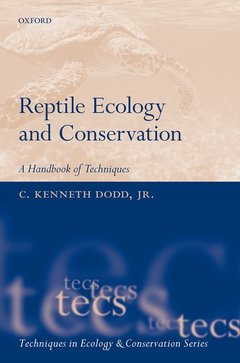Description
Reptile Ecology and Conservation
A Handbook of Techniques
Techniques in Ecology & Conservation Series
Coordinator: Dodd, Jr. C. Kenneth
Language: English
Subject for Reptile Ecology and Conservation:
Reptile Ecology and Conservation
Publication date: 05-2016
496 p. · 16x24.4 cm · Hardback
Publication date: 05-2016
496 p. · 16x24.4 cm · Hardback
Reptile Ecology and Conservation
Publication date: 05-2016
492 p. · 16.7x23.3 cm · Paperback
Publication date: 05-2016
492 p. · 16.7x23.3 cm · Paperback
Description
/li>Biography
/li>
This practical handbook of reptile field ecology and conservation brings together a distinguished, international group of reptile researchers to provide a state-of-the-art review of the many new and exciting techniques used to study reptiles. The authors describe ecological sampling techniques and how they are implemented to monitor the conservation status and population trends of snakes, lizards, tuatara, turtles, and crocodilians throughout the world. Emphasis is placed on the extent of statistical inference and the biases associated with different techniques and analyses. The chapters focus on the application of field research and data analysis for achieving an understanding of reptile life history, population dynamics, movement patterns, thermal ecology, conservation status, and the relationship between reptiles and their environment. The book emphasises the need for thorough planning, and demonstrates how a multi-dimensional approach incorporates information related to morphology, genetics, molecular biology, epidemiology, statistical modelling, animal welfare, and biosecurity. Although accentuating field sampling, sections on experimental applications in laboratories and zoos, thermal ecology, genetics, landscape ecology, disease and biosecurity, and management options are included. Much of this information is scattered in the scientific literature or not readily available, and the intention is to provide an affordable, comprehensive synthesis for use by graduate students, researchers, and practising conservationists worldwide.
Ken Dodd is currently Courtesy Associate Professor in the Department of Wildlife Ecology and Conservation at the University of Florida. He has previously held positions at Mississippi State University as Assistant Professor in 1975, Staff Herpetologist at the Office of Endangered Species in the US Fish and Wildlife Service from 1976 to 1984, and Research Zoologist at the US Geological Survey from 1984 to 2007. He has published over 210 research and popular articles, book reviews and book chapters and edited the Amphibian volume in OUP's Techniques in Ecology and Conservation Series. He is a past President of the Herpetologists' League and was Associate Editor for the Journal of Herpetology for over 8 years. His professional interests are conservation biology, population ecology and demography, monitoring vertebrate populations, sampling approaches, and history of herpetology. Ken lives in Gainesville, Florida, with his wife Marian Griffey and their 8 cats and numerous turtles.
© 2024 LAVOISIER S.A.S.
These books may interest you

Personality in Nonhuman Animals 126.59 €

Personality in Nonhuman Animals 179.34 €


